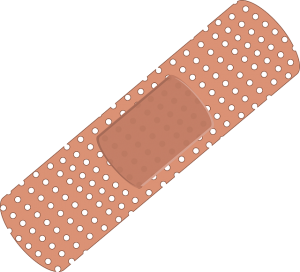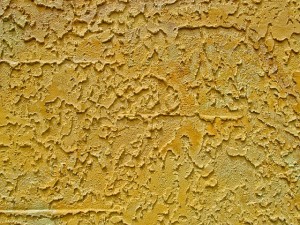1. sticky, clammy, soggy [adjective] [‘klef‘] ![]()
Today’s weather is an example of "klef": very warm, moist and damp (at least for Dutch standards…:-) ). In this context, the synonymous "klam" is also used a lot.
Examples:
– "Wat een klef weer vandaag! Ik zweet als een otter…"
("Such clammy weather today! I’m sweating like a pig…" Lit.: "…like an otter…")
– "Dit kleffe weer leidt waarschijnlijk tot een onweer later vanmiddag."
("This sticky weather will probably lead to a thunderstorm later this afternoon.")
Related words:
– "Klam": clammy, moist, damp.
– "Vochtig": damp, humid.
– "Plakkerig": sticky.
2. sticky, gooey [adjective] [‘klef‘] ![]()
Food can also be "klef". See the Examples.
Examples:
– "Deze boterham is helemaal klef geworden door het klamme weer."
("This sandwich has turned completely gooey because of the clammy weather.")
– "Ik ga even een snack uit de muur trekken." – "Bah, kleffe hap man.."
("I’m gonna quickly grab a snack from the vending machine." – "Yech, gooey stuff man…" Lit.: "…gooey bite…")
3. clinging (to one another) [adjective] [‘klef‘] ![]()
And even people can be "klef", when they’re constantly clinging to each other, giving each other hugs and kisses while holding hands all the time… In this context, the activity of being "klef" is called "kleffen".
Examples:
– "Frank en zijn vriendin waren op het feestje verschrikkelijk klef."
("Frank and his girlfriend were constantly clinging to each other at the party.")
– "Kijk Myra en Jan…ze zijn enorm aan het kleffen!"
("Look at Myra and Jan… they’re really clinging to each other.")
Related words:
– "Verliefd": in love.

 Een “pleister” is what you put on small wounds to stop them from bleeding. When the wound is larger, or after surgery, the wounds are protected by bandages, which are translated by “verband” (singular). A second meaning of “pleister” is explained below.
Een “pleister” is what you put on small wounds to stop them from bleeding. When the wound is larger, or after surgery, the wounds are protected by bandages, which are translated by “verband” (singular). A second meaning of “pleister” is explained below. Another meaning of “pleister” or “pleisterwerk’ is stucco.
Another meaning of “pleister” or “pleisterwerk’ is stucco.

